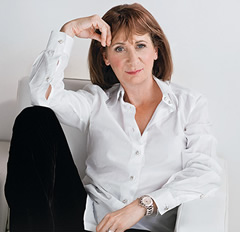Joy Fielding heroines have much to endure. At the outset of Fielding’s latest thriller, Now You See Her, middle-aged Marcy is mourning a double loss as she drags herself desultorily around rainy Ireland – her daughter, Devon, has apparently perished in a canoe accident, a suspected suicide. In the wake of that tragedy, her husband’s left her for a comely, young golf pro. As it happens, I’m reading this novel – the 23rd produced by this international publishing phenom – the day after seeing the classic Mildred Pierce, starring Joan Crawford. The juxtaposition makes me realize how much Fielding’s oeuvre has in common with emotionally full-figured, female-centric movies: Fielding (BA 1966 UC) loads her Everywoman characters with multiple travails to see if they break, bend or beat back the challenge.
As with Mildred Pierce, where the title character struggles under the lifelong burden of an ingrate daughter (“She gave her daughter everything, but everything was not enough”), Fielding focuses here, and in her work generally, on the ties between mothers and daughters. “I am the daughter of an extraordinary mother, and the mother of two daughters,” she says. “I use that in my work, and find myself returning again and again to it.” In fact, her latest novel is dedicated to her two daughters, now in their 30s: Shannon, an actor-singer who’s appeared in a TV dramatization of a Fielding book, and Annie, an ad exec and mother of Fielding’s first grandchild.
Her daughters haven’t struggled with bipolar disorder, as Marcy’s daughter does, but Fielding gives Marcy her own worries about whether she’s been a good – or good-enough – mother. “Like her, I’ve always felt guilty for yelling at my daughter for drawing on the walls, once when she was little,” Fielding admits. Still, she fondly recalls dandling them on her knees as she typed out her early thrillers.
Although the latest book is a meditation on the tenacity of the mother-daughter bond, it is also, as per Fielding’s usual, a page-turner. The book’s action gets underway when Marcy sees, or thinks she sees, her daughter – alive! – in pretty, historic Cork. This compelling setup enables Fielding to go deep into the disturbed psyche of a woman who blames herself for her daughter’s departure and her impending divorce. As all those women’s pictures wonder, will she have the strength to carry on?
Recent Posts
U of T’s 197th Birthday Quiz
Test your knowledge of all things U of T in honour of the university’s 197th anniversary on March 15!
Are Cold Plunges Good for You?
Research suggests they are, in three ways
Work Has Changed. So Have the Qualities of Good Leadership
Rapid shifts in everything from technology to employee expectations are pressuring leaders to constantly adapt






